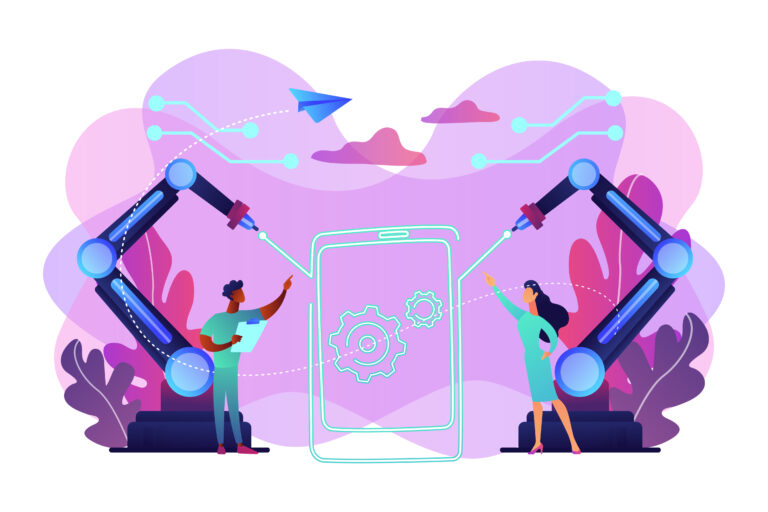AI tools in content creation
Content creation has become an indispensable component of successful digital marketing strategy. However, the demands for high-quality, engaging content across multiple platforms have intensified, putting pressure on businesses to produce more content faster than ever before. This is where artificial intelligence (AI) tools are making a huge impact, reshaping the content creation process and empowering marketers to meet these challenges head-on.
Key Benefits of AI Tools in Content Creation
AI-powered content creation tools leverage advanced algorithms, machine learning, and natural language processing (NLP) to streamline and enhance various aspects of the content production process. From generating ideas and conducting research to writing, editing, and optimizing content, AI tools are becoming increasingly sophisticated and capable of producing human-like output. Some of the key benefits of such tools include:
- Enhanced Efficiency: AI tools can significantly reduce the time spent on repetitive tasks, allowing content creators to focus on strategy and creativity. For instance, AI can quickly generate outlines, draft initial content, or even create entire articles based on given prompts or topics.
- Consistency: AI can help maintain a consistent brand voice and style across various content pieces and platforms. This is particularly valuable for businesses with multiple content creators or those operating across different markets.
- Scalability: With AI assistance, businesses can produce more content without necessarily increasing their team size. All the repetitive tasks can be tackled easily and AI can help identify trending topics, optimal posting times, and content formats that resonate with the target audience adding increasing efficient. This is crucial for growing businesses or those looking to expand their content marketing efforts.
- SEO Optimization: Many AI tools incorporate SEO best practices, helping content rank better in search engine results. They can suggest relevant keywords, optimize meta descriptions, and even provide recommendations for internal linking.
- Personalization: AI can analyze user data to create personalized content experiences, increasing engagement and conversion rates.
- Multilingual Content: Some AI tools can assist in translating and localizing content for different markets, helping businesses expand their global reach.
Rava AI: A Comprehensive Solution for Startups
One notable player in the AI content creation space is Rava AI, a marketing copilot platform designed specifically for startups. RAVA AI stands out by offering a comprehensive solution that can help plan, create, and analyze content. This all-in-one approach makes it particularly valuable for startups looking to maximize their marketing efforts with limited resources.
Key features of Rava AI include:
- Content Planning: Rava AI can help startups develop marketing and content strategies aligned with their business goals and target audience. It can do business analysis, identify ICPs, narrow on customer personas, suggest topics, create content calendars, and even recommend the best channels for distribution.
- Content Creation: The platform assists in generating various types of content, from blog posts and social media updates to email newsletters and ad copies. It can adapt to different brand voices and styles, ensuring consistency across all content.
- SEO Optimization: The platform incorporates SEO best practices, helping startups improve their search engine rankings and visibility.
- Competitor gaps: Rava AI can analyze competitors’ content strategies, providing valuable insights that startups can use to refine their own approaches.
- Integration Capabilities: The platform can integrate with various marketing tools and platforms, streamlining workflows and enhancing overall marketing efficiency.
Other Notable AI Content Creation Tools
While Rava AI offers a comprehensive solution for startups, there are several other AI tools making waves in the content creation space:
- Jasper AI: Known for its versatility, Jasper AI can generate various types of content, from blog posts to marketing copy. It offers templates for different content types and can even write in multiple languages.
- Copy.ai: Specializes in creating marketing content like ad copy, product descriptions, and email newsletters. It’s particularly useful for e-commerce businesses and digital marketers.
- Writesonic: Focuses on SEO-optimized content creation, including blog posts and even eBooks. It also offers features like paraphrasing and expanding on existing content.
- Any word: This AI-powered writing tool focuses on creating SEO-friendly content. It offers real-time suggestions for improving readability and search engine optimization.
- Scalenut: A content intelligence platform that uses AI to provide detailed content research, planning, and creation, enhancing overall content strategy.
- Rytr: A cost-effective option for businesses looking for an AI writing assistant. It offers a wide range of writing templates and can generate content in multiple languages.
- SurferSEO: Combines content creation with SEO optimization to improve search rankings. It provides real-time content scoring and suggestions for improvement based on top-ranking pages.
The Impact of AI on Content Creation Workflows
The integration of AI tools into content creation workflows is having a profound impact on how marketing teams operate:
- Ideation and Research: AI tools can analyze trends, customer data, and competitor content to suggest relevant topics and content ideas. This can significantly speed up the brainstorming process and ensure that content aligns with audience interests.
- Content Briefing: AI can generate detailed content briefs, including key points to cover, relevant statistics, and even suggested structures. This can help maintain consistency across different writers and streamline the content creation process.
- Writing and Editing: While AI-generated content often requires human oversight and editing, it can provide a solid starting point, reducing the time needed to create first drafts. Some AI tools can also assist with editing, suggesting improvements in grammar, style, and readability.
- Optimization: AI tools can automatically optimize content for SEO, suggesting relevant keywords, improving meta descriptions, and even recommending internal linking strategies.
- Distribution: Some AI tools can analyze the best times to post content on different platforms and even automate the distribution process.
- Performance Analysis: AI-powered analytics tools can provide deep insights into content performance, helping marketers understand what works and what doesn’t, and informing future content strategies.
Ethical Considerations and Limitations
While AI tools offer numerous benefits, it’s important to consider their limitations and ethical implications:
- Quality Control: AI-generated content may sometimes lack the nuance, creativity, or emotional resonance that human writers can provide. It’s crucial to have human oversight to ensure quality and accuracy.
- Originality: There are concerns about the potential for AI to generate content that’s too similar to existing works, raising issues of originality and potential copyright infringement.
- Transparency: Businesses should be transparent about their use of AI in content creation, especially when it comes to sensitive topics or industries where human expertise is highly valued.
- Data Privacy: AI tools often require access to large amounts of data to function effectively. It’s important to ensure that this data is handled ethically and in compliance with privacy regulations.
- Bias: AI models can inadvertently perpetuate biases present in their training data. It’s crucial to be aware of this possibility and work to mitigate any potential biases in AI-generated content.
The Future of AI in Content Creation
As AI technology continues to evolve, we can expect even more sophisticated tools to emerge. Some potential developments include:
- More Advanced Natural Language Processing: This could lead to AI-generated content that’s even more human-like and contextually appropriate.
- Enhanced Personalization: AI could create highly personalized content experiences, tailoring content to individual user preferences and behaviors in real-time.
- Multimodal Content Creation: Future AI tools might be able to create not just text, but also images, videos, and interactive content.
- Improved Integration with other MarTech: AI content tools could become more deeply integrated with other marketing technologies, creating more seamless and efficient workflows.
- Voice and Conversational AI: As voice search and smart speakers become more prevalent, AI tools may evolve to create content optimized for these platforms.
Conclusion
AI tools are transforming the content creation landscape, offering businesses of all sizes the opportunity to produce high-quality content at scale. Platforms like Rava AI are leading the charge, providing comprehensive solutions that cater to the specific needs of startups and small businesses.
However, it’s important to remember that while AI tools are incredibly powerful, they’re not meant to replace human creativity entirely. Instead, they serve as valuable assistants, augmenting human capabilities and allowing content creators to work more efficiently and effectively.
As these technologies continue to advance, businesses that successfully integrate AI into their content creation processes will likely find themselves with a significant competitive advantage in the digital marketplace. The key to success will lie in finding the right balance between AI assistance and human creativity, leveraging the strengths of both to create compelling, engaging content that resonates with audiences and drives business results.







